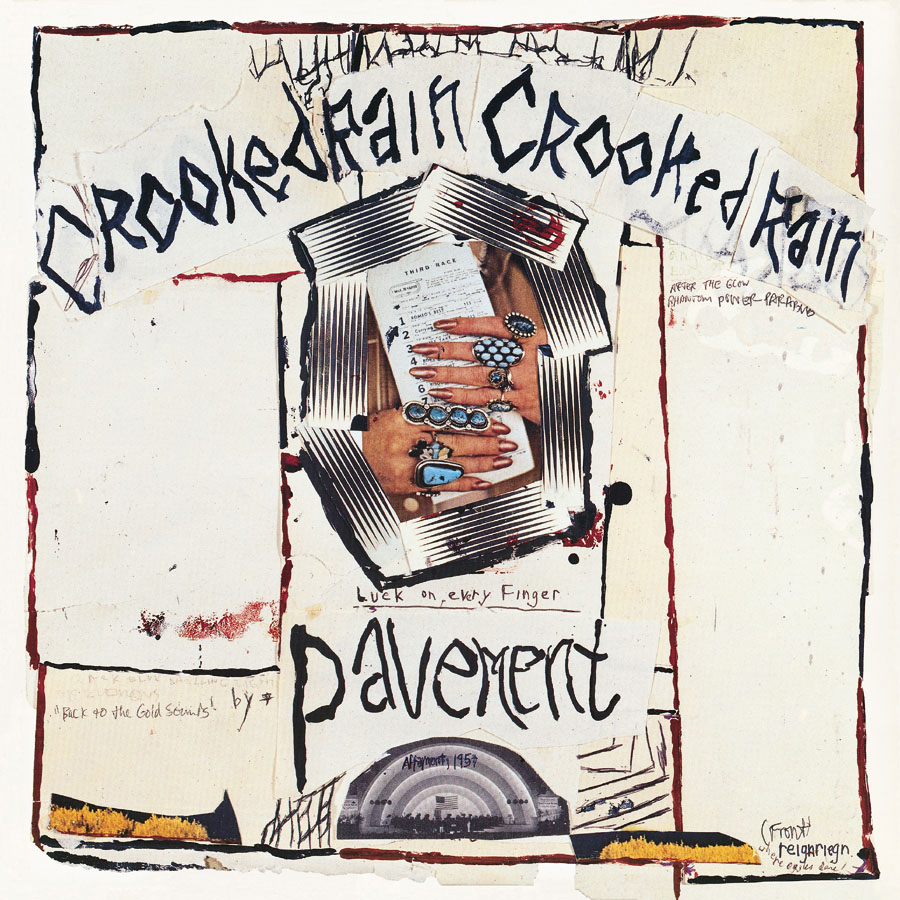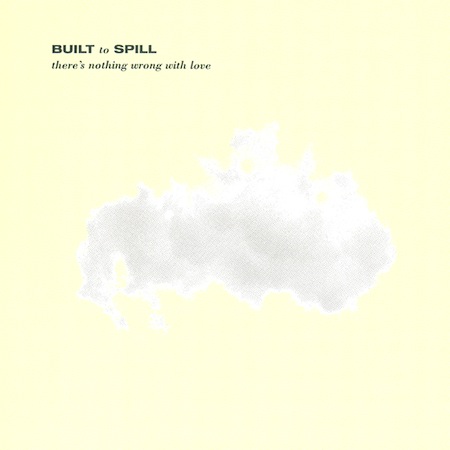Pavement : Crooked Rain, Crooked Rain

It’s fitting that Crooked Rain, Crooked Rain opens with a sloppy little warm up before kicking into “Silence Kit.” The essential Pavement album signified a major shift in the band and the beginning of a brand new era. Gone was original drummer Gary Young; that wild man, that lush, that gonzo who handed out cabbages and mashed potatoes to fans at shows. In was the rest of official line-up: drummer Steve West, bassist Mark Ibold, and fifth Pavementeer (for lack of a better term) Bob Nastanovich. In short, while Slanted and Enchanted was Pavement’s debut album, Crooked Rain, Crooked Rain was the debut of Pavement.
One of the baffling things about Crooked Rain, Crooked Rain is that it manages to be so eclectic yet cohesive. For instance, on the second half of the album you have a hook-filled gem, a jazzy instrumental in 5/4 time, a country ditty, a slump-shouldered slacker tune, a noisy pastiche of The Fall, and a rousing closer that invites the punk rockers and mods of the world to say goodnight to rock and roll. Add to this some songs about car thieves and sex, a disdain for political correctness, a full-forward appreciation of Northern California, and one ditty about hairdos and you can get some picture of this indie rock chimera.
“Silence Kit” helps sum up the album as a whole: While things may seem sloppy or peculiar at first (the introductory hiccups, the stop-start playing during the coda), it all works out nicely in the end. A lot of this has to do with the interplay between Stephen Malkmus and Scott Kannberg, who, on this album, perfected their sloppy-but-pretty guitar work. Some of the best guitar on Crooked Rain, Crooked Rain—the ascending lead on “Elevate Me Later”; the slinky, seedy rakes and licks of “Newark Wilder”; those little touches on “Gold Soundz” and “Cut Your Hair”; the jamming on “Filmore Jive” — sounds as if it were born of the moment, and born perfect. The same can be said of Malkmus’ lyrics which, though quirky and heartfelt, sometimes seem like a collection of ramblings, non-sequiturs, and in-jokes that were cobbled together on the spot to fit the song.
“Cut Your Hair,” the album’s first single, was the first Pavement song I’d ever encountered. I remember seeing it on Squirt TV back when that show had a mayfly’s life on MTV. To this date, I still think that “Cut Your Hair” is the gold standard of funny music videos. (I always laugh at the close-up of the forlorn King Malkmus.) The song focuses on the crazy music scene of the ’90s, specifically on how many new bands cared more about their image than their music. By contrast, Pavement never came across as image conscious. They often looked decidedly preppy, eschewing the flannel and tangled hair of the era.
Of all the songs on the album, it was the mellow, country-tinged “Range Life” that caused a stir. Billy Corgan apparently took offense to some of the song’s lyrics (“Out on tour with The Smashing Pumpkins / Nature kids, I/they don’t have no function / I don’t understand what they mean / And I could really give a fuck“) even though the lyrics were written from the point of view of an aging hippie. Malkmus claimed he was taking a jab at the band’s name (which he found funny), though he’s jabbed at Corgan in several interviews. There was a rumor that The Smashing Pumpkins threatened not to play 1994’s Lollapalooza if Pavement was added to the line-up. That rumor is false, much like the one about Gary Young pulling a gun on Malkmus before exiting the band. Pavement would later perform ironic live covers of “1979” at some of their shows, but with the lyrics a bit mangled. Neither Scott Weiland nor the rest of Stone Temple Pilots ever openly objected to being called “elegant bachelors” or “foxy.”
Both “Gold Soundz,” the second single (and which also had a pretty fun video) and “Filmore Jive” have grown on me over the years. “Filmore Jive” is a great capper to the album, particularly because of those lines about the old guard of rock and rollers saying goodnight to the rock and roll. It suggests (as the lyrics of “Newark Wilder” state outright) that it’s a brand new era. While “Filmore Jive” looks forward to this new era, “Gold Soundz” takes a nostalgic look backwards at an old relationship, and it does so with lots of playfulness and bounciness like only a good pop song can.
There’s actually a lot of nostalgia and appreciation for things past on Crooked Rain, Crooked Rain. Matt Diehl’s Rolling Stone review of the album noted that “Cut Your Hair” bore a “more-than-passing resemblance to Prince’s ‘Raspberry Beret'” (though I think it’s more “passing” than “more-than-passing”), and that there was a bit of Billy Squier’s “Everybody Wants You” at the end of “Range Life.” In fact, the vocal melody on “Silence Kit” is interchangeable with Buddy Holly’s “Everyday,” and vice versa. Looking back at Crooked Rain, Crooked Rain, I can’t help but feel that same nostalgia in my own lifetime, and that same appreciation for things past. Truly, it was a brand new era, and it still feels great.
Label: Matador
Year: 1994
Similar Albums:
Pavement : Crooked Rain, Crooked Rain
Note: When you buy something through our affiliate links, Treble receives a commission. All albums we cover are chosen by our editors and contributors.





